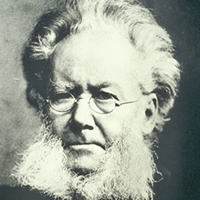Themes in A Doll's House
A Doll's House is popular for displaying the theme of the collapse of the parental ideal. Nora, at first, idealizes her father. To her, father was the very embodiment of masculinity or a flawless symbol of perfect ideals. As time elapsed, she was jolted into the awakening that her father was not what she had thought.

Henrik Ibsen (1828-1906)
She happened to know that her father was domineering to the point of cruelty. So she replaced the masculine image of her father with the image of Helmer. She was happy that her husband. Helmer is an ideal husband. She did not hesitate to idolize Helmer in much the same way as she idolized her father with a passage of time she came to notice some defects in the behaviors of her husband. She knew that Helmer too has feet of clay. She again replaced Helmer with the image of Dr. Rank, assuming that Dr. Rank's masculinity is far more perfect than that of Helmer, she gave some green light to Dr. Rank. She flirted with Dr. Rank. Therefore, it is far more relevant to say that Nora had been growing aware of a flaw-ridden masculinity. At last, when she decided to leave her children and husband for the cultivation of free womanhood, she found her miserable husband pleading with her so that she would stay with him. Helmer, at the final hour, tried to make Nora stay with him by appealing to her sense of duty. From this pleading posture of Helmer, at the climactic moment, we come to know that even the arrogant Helmer recognized importance of his dependence upon her. Previously Helmer had been boastful of his role as a breadwinner. Finally, even the breadwinner felt his dependence upon her. Even such an arrogant Helmer, who used to feel superior, was afraid of loneliness resulting from Nora's separation. He knew, by that time, the fact that gender inequality is a fiction. No one can claim his or her autonomous existence. This line of the growing awareness on the part of Helmer marks the moment of the collapse of the parental ideal. Hence, the basic thematic pattern of A Doll's House is to present the truth that no gender, no sex has a right to assert domination over another. Every sex, every gender has a right to pursue his or her vision or dream.
Another important theme of A Doll’s House is appearance versus reality. In A Doll's House almost all characters are obsessed with their appearance. As far as possible, all of them work hard to keep their appearance intact forgetting their ugly realism. The inner reality of all characters are grim and ugly. But they do not hesitate to give their sole attention to appearance. Torvald Helmer insists on keeping up the appearance of marriage even after rejecting Nora for her past crime. He is amazed when Krogstad calls him by his first name at the bank. Dr. Rank wants to appear healthy. Krogstad and Nora want to hide their deeds. They are trapped in a tissue of lies. As the play progresses the veil of appearance slowly falls and naked truth shines harmfully and unpleasingly.
The relation between the individual and society is an important thematic preoccupation of Henrik Ibsen. Ibsen upholds the view that society must function in keeping with the aspiration of the individual. Society, according to Ibsen, must not be too coercive to stunt the delicate unfolding of the true nature of the individual. If society becomes favorable to the collective wish and aspiration of individuals, they must freely express their nature. But the society does not do so. Society always blocks the spontaneous growth of the individual. Here a question arises, can't an individual triumph over society? Ibsen says an individual can triumph over society, but he/she must be ready to pay the price. The price is heavy. According to Ibsen, only those persons can triumph over society who are ready to be social outcasts. Nora was ready to become a social outcast in her rebellious attempt to question the society. When Krogstad tells Nora that the law takes no account of good motives, she cries "Then they must be very bad laws". Elsewhere in the play Nora said "I can't go on believing what the majority says, or what is written in books. I have to think over these things myself and try to understand them". Through the medium of this play the dramatist wants to communicate the pristine truth that it is possible for an individual to triumph over society. But, additionally, he also states another truth that the cost is pretty heavy.
In "Notes on Modern Tragedy" Ibsen declared that the primary duty of any person is to know who he/she really is. Nora was, at first, happy to live as a wife and as a mother to three handsome children. She had no regard for and no knowledge of herself. At the final shock, she was jolted to the rapidly dawned awareness of herself. The moment she came across the importance of her self-nature, herself and her identity, she realized that importance of one unique sense of duty. This unique duty is to know oneself. This is the only duty to make life worthwhile. The duty as a wife, the duty as a mother, and the duty as a friend are all meaningless when the unique duty to oneself arises.
A Doll's House Study Center
Signification of the Slamming of the Door in A Doll's House
Nora's Identity as a Person in A Doll's House
Parallelism and Contrast in A Doll's House
The Plot Construction in A Doll's House
